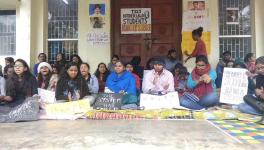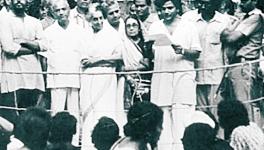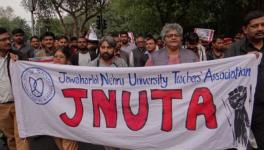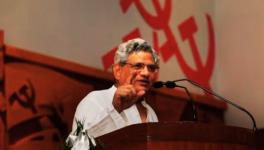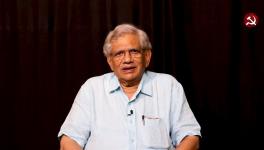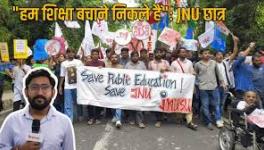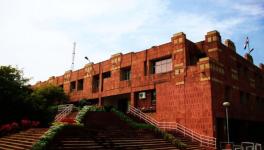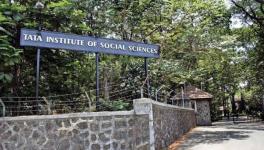JNUSU Fights UGC Gazette
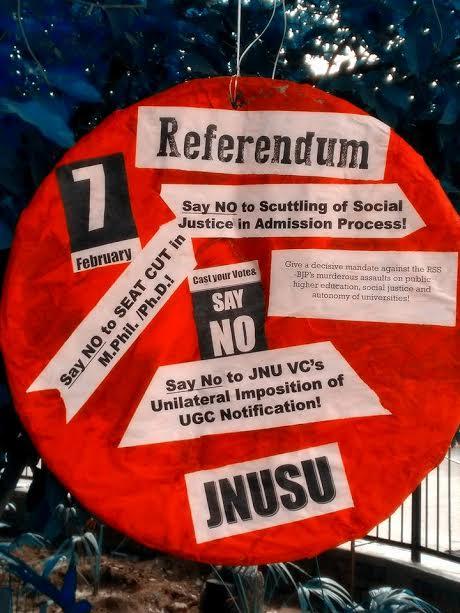
Jawaharlal Nehru University Student’s Union conducted a referendum on 8th February, 2017. 3455 students casted their votes, out of which 98% voted against the UGC Gazette. The university is seeing an indefinite strike against the UGC gazette for past 10 days.
A year ago, on 9th February, Jawaharlal Nehru University faced the worst kind of attack by the current right-wing political regime in the centre along with the collaboration of its Vice Chancellor. Students were arrested and the whole university was branded “anti-national”. People wearing JNU sweatshirts were harassed in public. The premier research university was defamed by some mainstream media houses by reporting twisted and false news. The students, teachers and karamcharis of the Jawaharlal Nehru University fought unitedly against the created fallacy.
Once again, the university is under attack. This time, again, the attack comes the government imposition with an unrelenting support from within.
Jagadesh Kumar took charge as the Vice Chancellor of JNU on 27th January 2016. His tenure till today has been a struggle for the university fraternity. The completion of his first year is marked by his imposing the UGC notification of 5th May 2016. The UGC notifications are nothing but a blueprint for curtailing JNU’s M.Phil./Ph.D. research programmes and the inclusive admission policy that evolved over several generations of students struggle.
His tenure saw the highest number of notices and punishments to students and teachers alike. Students demanding justice for Najeeb are punished while the ABVP students who attacked Najeeb are protected. JNU prides itself in historically providing democratic space for the students, even to protest against the administration. The administrative block has always been a space for the student movement’s voice against the unjust policies of the administration. The Ad Block, also known as Freedom Square is suddenly banned from protests. Surveillance has been unleashed on public meetings and student leaders and faculty participating in public meetings are threatened with show-cause notices. The most brazen form of political partisanship marks the administrative functions.
The JNU VC is also undermining all the institutions within the university and humiliating the faculty members heading them – unless they fall in line with his politics. The resignation of no less than two Chief Proctors during the very first year of this VC’s tenure is proof enough!
The members of the Academic Council had expressed their strong opposition to the way the recent Academic Council meetings had been undemocratically concluded.
The UGC notification which the VC abruptly invoked on 5th May 2016 has the following impositions and implications.
- It says that the Mphil/PhD admission should be 100% Viva-based and also undermines JNU’s deprivation points in admissions.
This will alter JNU’s entire admission policy.
The Prof. Abdul Nafey committee was constituted after JNUSU’s struggle. It came to a conclusion based on the analysis of the admission related data, that discrimination based on caste and ‘social group’ is a reality. Hence, it recommended that the viva marks be reduced from ‘30% to 15%’ to mitigate this discrimination. But the new imposition pushes towards 100% viva-based admission process with the written examination reduced to a mere qualifier. It is also important to note that a 5-judge Constitution Bench verdict in 1980 forbids any selection process to have more than 15% weightage for viva because of the discriminatory potential structurally embedded in any interview process.
Instead of approving the Nafey Committee recommendations, the VC is pushing for a discriminatory 100% viva based admissions.
- The UGC notification lays down strict rules regarding the eligibility of “research supervision”. It says: “A Research Supervisor/Co-supervisor who is a Professor, at any given point of time, cannot guide more than three (3) M.Phil. and Eight (8) Ph.D. scholars. An Associate Professor as Research Supervisor can guide up to a maximum of two (2) M.Phil. and six (6) Ph.D. scholars and an Assistant Professor as Research Supervisor can guide up to a maximum of one (1) M.Phil. and four (4) Ph.D. scholars.”
This implies cutting seats for M.Phil./Ph.D. admissions.
The JNU faculty has never complained of being ‘overburdened’ with ‘excess research scholars’; on the contrary, they have forcefully opposed the UGC notification – yet the VC is using the UGC notification to impose a straightjacket formula disregarding the specific needs and potential of JNU. Instead of expanding the faculty strength and implementing reservations in faculty selection, the VC proposes to cut down the number of researchers.
- The existing eligibility marks (of the last qualifying exam) for applying to M. Phil./Ph.D. in different centres of JNU vary from 45% to 55% keeping, in terms with the diversity of JNU’s academics. The UGC notification dictates blanket 55% criteria in the last qualifying exam for all subjects.
The implementation of such rigid straight-jacketed criteria will deny thousands of students the opportunity to even apply for JNU’s M.Phil./Ph.D. programmes, students from deprived sections would face the largest casualty.
- In order to be called for the viva voce for M.Phil. admissions, earlier students needed minimum marks of 35% for unreserved categories, 31.5% for OBCs and 25% for SC/ST/PH out of 70 in the written exam. According to the present UGC circular, all students have to obtain a minimum of 50% marks in the written exam, with no mention of relaxation to students from deprived backgrounds.
This model will restrict the implementation of the constitutionally guaranteed reservation policy, which amounts to a serious violation of Constitutional principles
- In the current admission system of JNU, the marks of the written and the viva are added to get the final scores. Hence, the deprivation points can be added to the written marks. However, in the new scheme of things, the marks of the 2 components will be considered independently.
This move will directly affect the progressive deprivation point system followed by the university.
- There is also a fee hike proposal for JNU’s admission application form which was ‘passed’, ignoring JNUSU’s strong opposition to it.
Students from economically deprived classes will find it hard to access the premier university. At a time when education has become a business, JNU has been an inclusive campus for students from all backgrounds.
The JNUSU’s ongoing agitation has the following demands:
- To revoke Imposition of Unconstitutional UGC Notification
- Resist Massive Seat Cut in M.Phil./Ph.D.
- Revoke 100% Viva! Reduce Viva to 15% as per Nafey Committee
- Reconvene 142nd AC Meeting and remove All Anti-Student Impositions
- End the Regime of Victimisations, Notices and Intimidations
Get the latest reports & analysis with people's perspective on Protests, movements & deep analytical videos, discussions of the current affairs in your Telegram app. Subscribe to NewsClick's Telegram channel & get Real-Time updates on stories, as they get published on our website.









